Moving can be one of the most stressful events in a person's life. Are you planning on renting a U-Haul for the big day but don't know whether one can tow a travel trailer? Is there a towing capacity on a U-Haul truck rental? Well, we've done some research and have the answers here for you.
In general, a U-Haul truck will be able to safely tow a travel trailer. Considering that the average U-Haul has a towing capacity of around 6,000 pounds, you shouldn't run into any problems with a small to a mid-size trailer.
With that said, it is a good idea to consult with U-Haul beforehand, so they can recommend the right vehicle for you to rent.
As we begin, we will cover all things U-Haul and discuss whether one can tow a travel trailer. You've come to the right place if you're stressed about moving or need a game plan before renting a U-Haul. With that said, let's dive right into this topic!
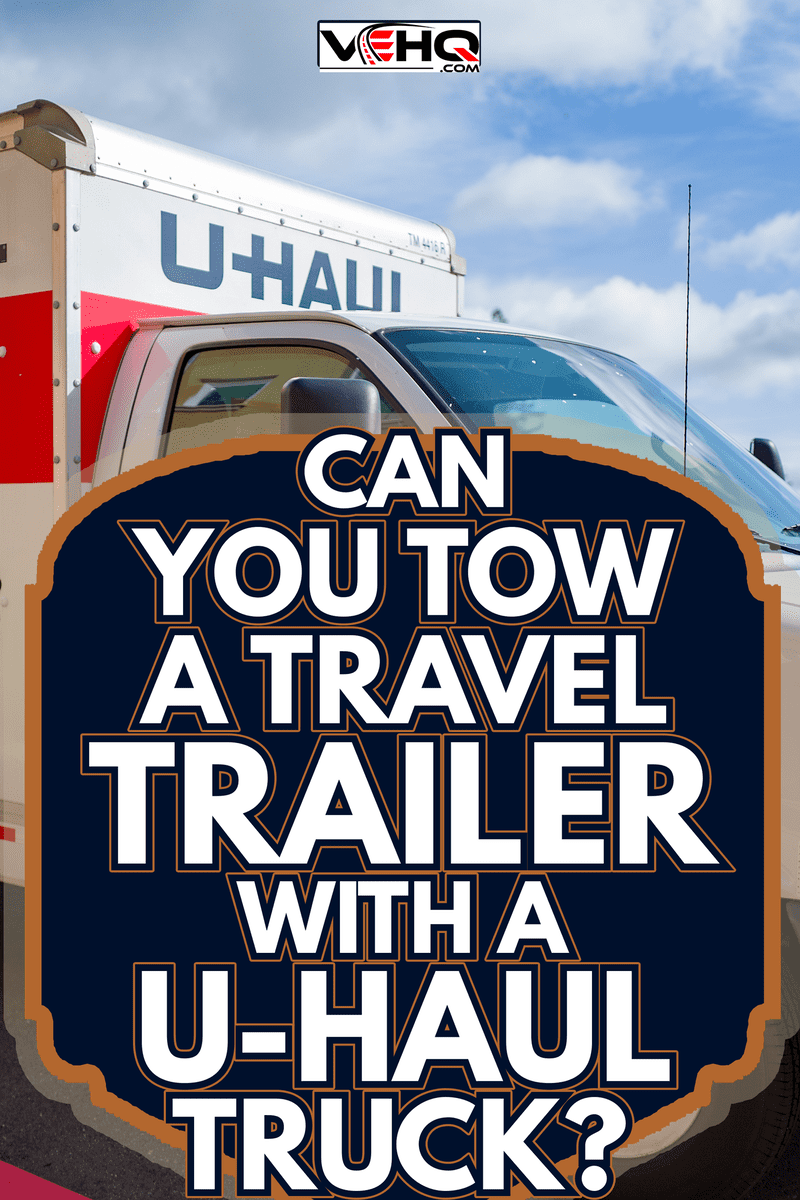
Can A U-Haul Tow A Travel Trailer?
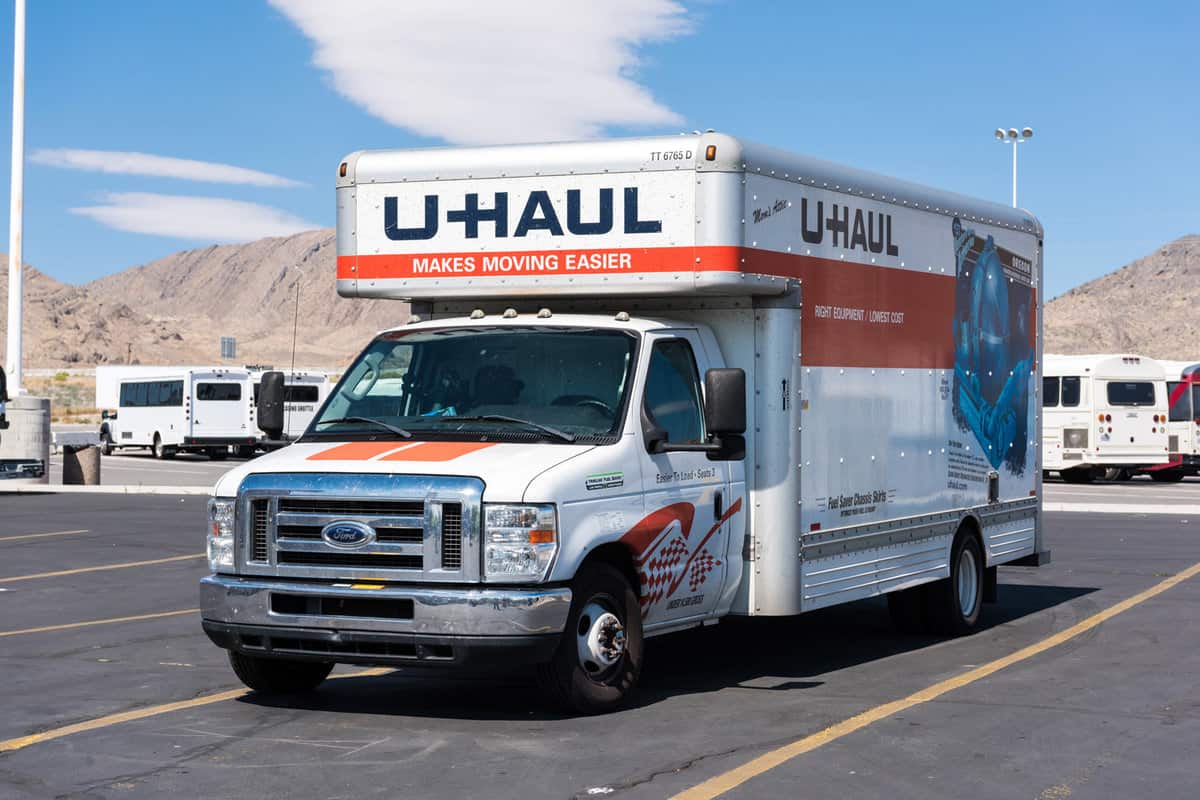
Yes, a U-Haul will be able to tow a small to a mid-sized travel trailer. Considering that every U-Haul moving truck has a hitch installed that will allow you to pull a camper/trailer.
According to the company's website, every U-Haul truck has a towing capacity of around 6,000 pounds. That is more than enough for a standard-size trailer, so you're in luck.
Furthermore, U-Haul offers various moving truck rentals, including a standard eight-foot pick-up truck to a 26-foot long option.
The company also offers help attaching a travel trailer or camper to your rental, so it's a one-stop-shop. Again, it's always good to reach out to them before making a deposit for your truck to ensure the U-Haul can support your trailer's weight.
How Much Does The Average Travel Trailer Weigh?
Although there is a wide variety in travel trailer sizes, you can usually expect one to weigh between 1,000 to 9,000 pounds. Again, this will depend on the size and design of your vehicle, so everyone is different.
According to TAXA Outdoors, the average dry weight of a camper trailer is 5,200 pounds, which falls under U-Haul's 6,000-pound limit for most of its trucks.
Typically, a travel trailer won't be super heavy, as it's meant to attach to a regular truck/SUV. Additionally, the average 30-foot travel trailer will weigh around 5,200 and 5,800 pounds dry weight, which is still under 6,000.
When we say 'dry weight,' that means the water tanks on your trailer are empty. It also means you don't have any heavy gear inside your trailer.
It's generally a good plan to remove bulky items from a trailer or camper before attaching them to a U-Haul. A heavier travel trailer means less mileage per gallon, ultimately running your rental price up.
If you can, try to place any additional items into the U-Haul truck itself or take a few trips to ease the amount of fuel you burn.
Having your water tanks full or bulky items inside a trailer can increase its weight to over 7,000 pounds, which won't work with a U-Haul.
How Do I Prep A Travel Trailer For Moving?
For anyone trying to plan their move, it's essential to pack up your travel trailer. Generally, you want to secure any delicate items or furniture inside your vehicle before moving it.
You can place valuables into shipping boxes or at least wrap them in padding. You also want to make sure any doors, cupboards, and hatches are closed and secure.
If you fail to secure these, expect a mess inside your trailer after the big move. Furthermore, it's also best to disconnect any electronics inside your trailer (inc, the gas, and the power supply).
Another critical step is to inspect your trailer. That means your tires, wheels, fluid levels, breaks, and engine need to be in good working condition.
The last thing you want is for your trailer to lose a tire or have a major problem while you're towing it.
Is U-Haul Good For Towing A Travel Trailer?
Overall, we would agree that renting a U-Haul will be beneficial for towing a travel trailer. Besides having a hitch attached, U-Haul moving trucks can tow 6,000 pounds on average, more than enough for a trailer/camper.
In addition, U-Haul offers various truck sizes for your move. So if you pack light, you can probably get away with renting their smaller eight-foot pick-up truck to tow your trailer.
As we covered above, it's good to empty the water tank(s) inside your trailer before moving it, as this can help lower its total weight.
You also need to think about the size of your U-Haul rental. For example, a 26-foot-long moving truck will be sufficient for towing more items and a heavier trailer and may reduce your overall driving time.
Although making multiple small trips with items can seem helpful, renting one massive truck is the fastest, most affordable option.
Also, if your trailer has boxes inside, it may be too heavy for a smaller U-Haul pick-up truck. Remember, every vehicle has a towing capacity, which can't usually withstand any extra weight.
How Much Does It Cost To Rent A U-Haul Truck?
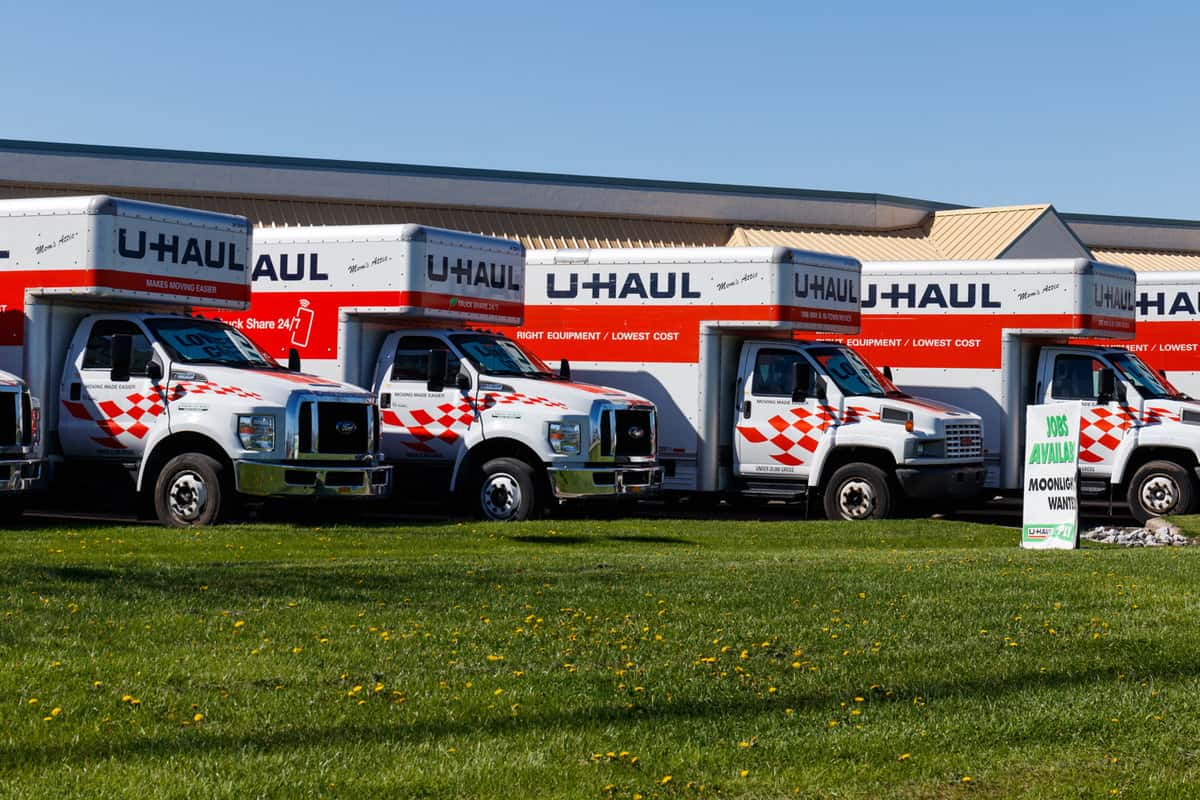
According to U-Haul's site, their truck rentals start at $19.95, one of the lower rates on the market. Of course, U-Haul offers various rentals, whether by the hour, day, or even more extended periods.
Typically, U-Haul rents their vehicles by the day, which is what you will likely need during your move.
From a chart we found on My Move, this is what you can expect to pay for a one-day rental from U-Haul:
- 10-foot truck - $19.95 plus $0.79 per mile
- 15-foot truck - $29.95 plus $0.79 per mile
- 20-foot truck - $39.95 plus $0.79 per mile
- 26-foot truck - $39.95 plus $0.79 per mile
On top of these figures, you can also expect other fees, depending on what add-ons your truck has and how far you're going.
U-Haul is often the best option for one-day or local moving, hence why it's so popular. Furthermore, U-Haul also offers moving services, like professional help, so you don't have to do any heavy lifting.
That typically costs between $150 and $200, depending on your state. You also have to consider the time you need professional help, which could mean a much higher price tag for extended moving periods.
Luckily, U-Haul does offer a helpful online price estimator for their moving services, which shows you the costs for two movers, for two hours, across the United States.
Does U-Haul Have Hidden Fees?
Although U-Haul is a fan favorite among renters and homeowners, there are complaints about hidden fees and related charges. For example, some customers claim they spend closer to $60 for a one-day move, although U-Haul advertises it as costing closer to $20.
According to an article from ABC Cincinnati, some U-Haul renters ended up paying $58 with all of the included 'fees' for their moving truck.
One of these charges, the infamous $25 "cleaning fee," is what took the most significant chunk. On top of the extra cleaning charge, many users paid mileage fees and any additional taxes.
Of course, taxes are not very surprising, as everything has a sales tax, but U-Haul should do a better job of making this clear to prospective customers.
Another one of U-Haul's added charges tends to fall into a protection option. This is the 'Damage Protection' add-on, totaling around $10 per truck rental.
This will cover any unexpected damage to the truck, although we recommend reading the entire list of Q&As here before making any decisions.
Again, U-Haul is in the business of making money, so when they can charge extra, they will.
Is U-Haul The Best Moving Company?
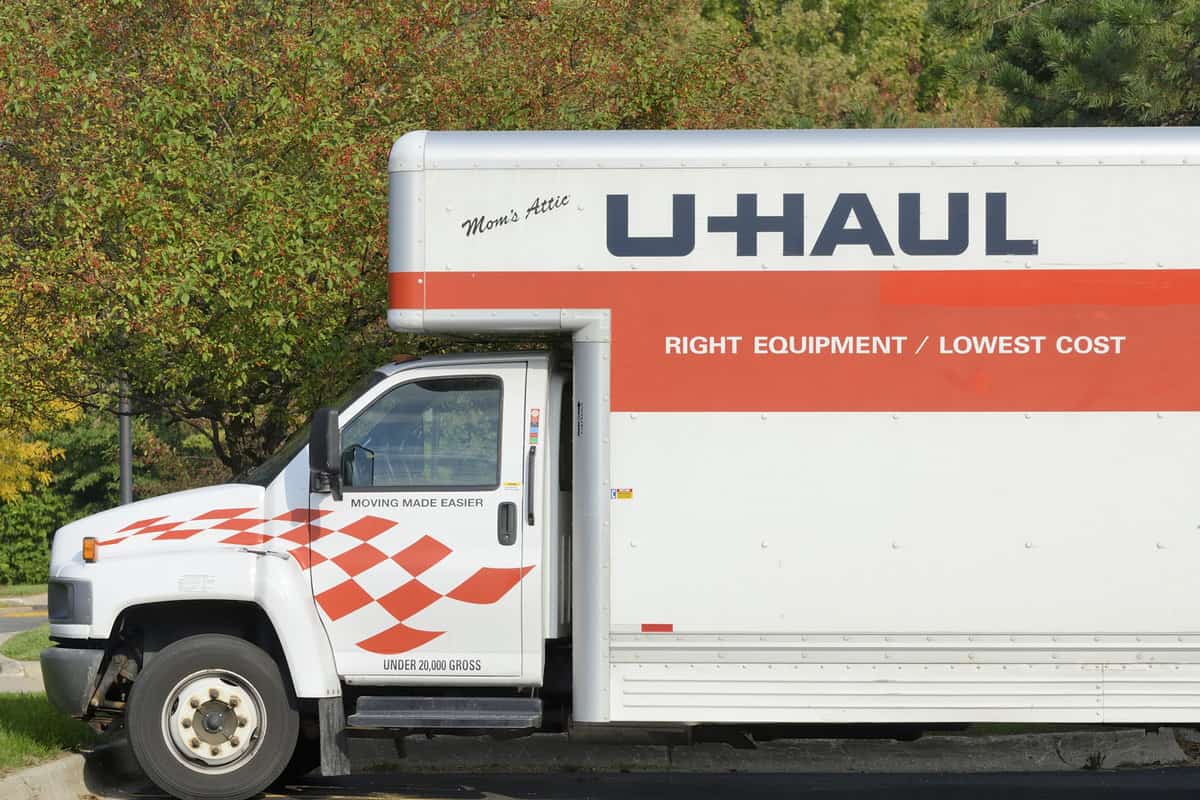
Among the countless moving companies out there, U-Haul is one of the best options. Besides being affordable, the brand offers various trucks, trailers, and professional moving services, all for a somewhat low price.
Considering that the average price for using U-Haul is around $40 per hour, it is one of the cheapest 'help-for-hire' companies.
According to US News, they rank U-Haul as the sixth-best option in the country, which is pretty impressive. As we said, moving is expensive regardless of who you use, so you might as well find an affordable hourly/daily rate, even if there are some additional fees.
On top of their trucks and services, U-Haul also has a great selection of shipping materials. Unlike some movers, the brand sells everything you need to pack your belongings for a reasonable price.
So if you aren't moving too far and want a trustworthy, affordable moving option, we recommend trying U-Haul out.
What Is The Cheapest Way To Move?
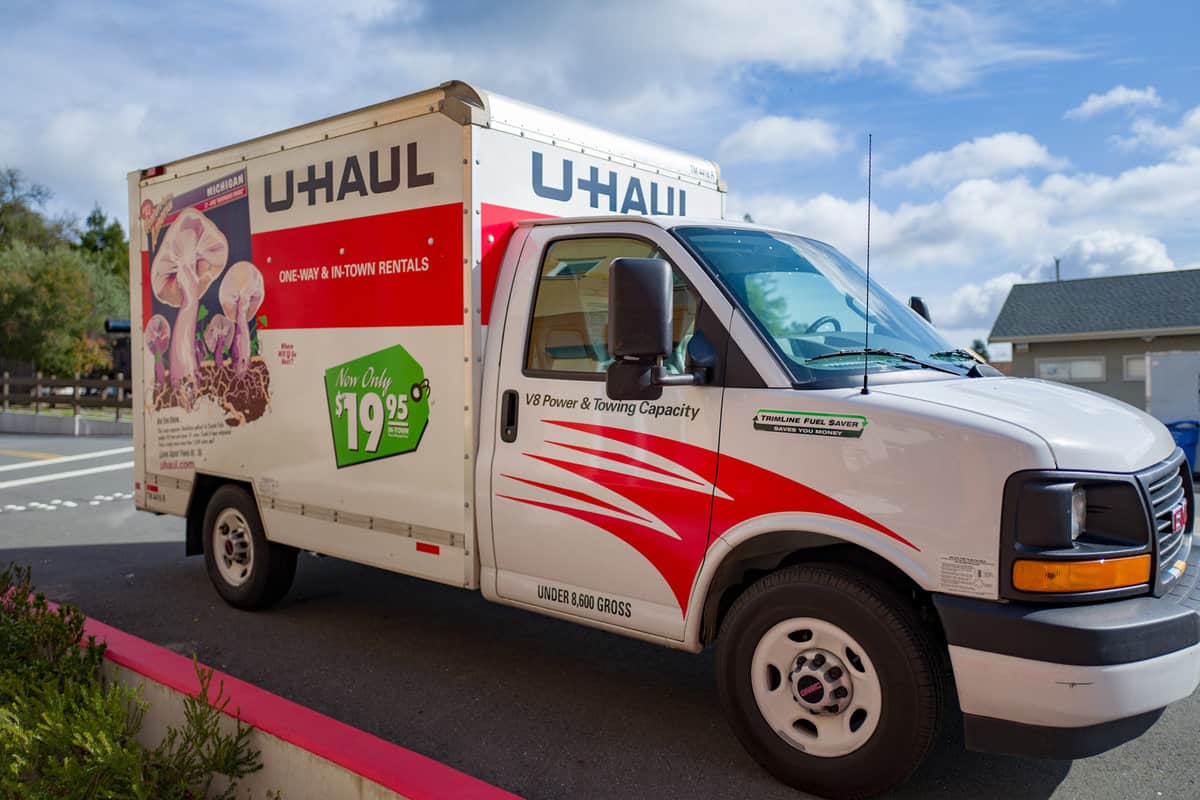
When it comes to the cheapest way to move, this comes down to a few factors. First, the less stuff you have, the cheaper your moving costs will be.
So a good way to lessen the total expense would be to sell large items and extra things you don't need. Another thing to do is find recycled or used moving supplies.
If you live in an apartment, you can ask neighbors, staff, or anyone you see moving for their leftover materials. Furthermore, the cheapest way to move is doing it yourself.
Hiring professional movers can be hundreds of dollars per day, which isn't always cost-effective. Instead, invite some friends to help, and finish the day off with a nice meal for everyone.
To Wrap It Up
Whether you need to move across the country or down the street, it's essential to know how to get your items from point A to B. From what we found, you can tow a travel trailer with a U-Haul as long as it is under 6,000 pounds.
It's also good to secure everything inside your trailer, empty the water tanks, and remove bulky items to lessen the total weight. This can help save gas and make for a safer move.
Made it to the end? Check out these helpful related posts!
